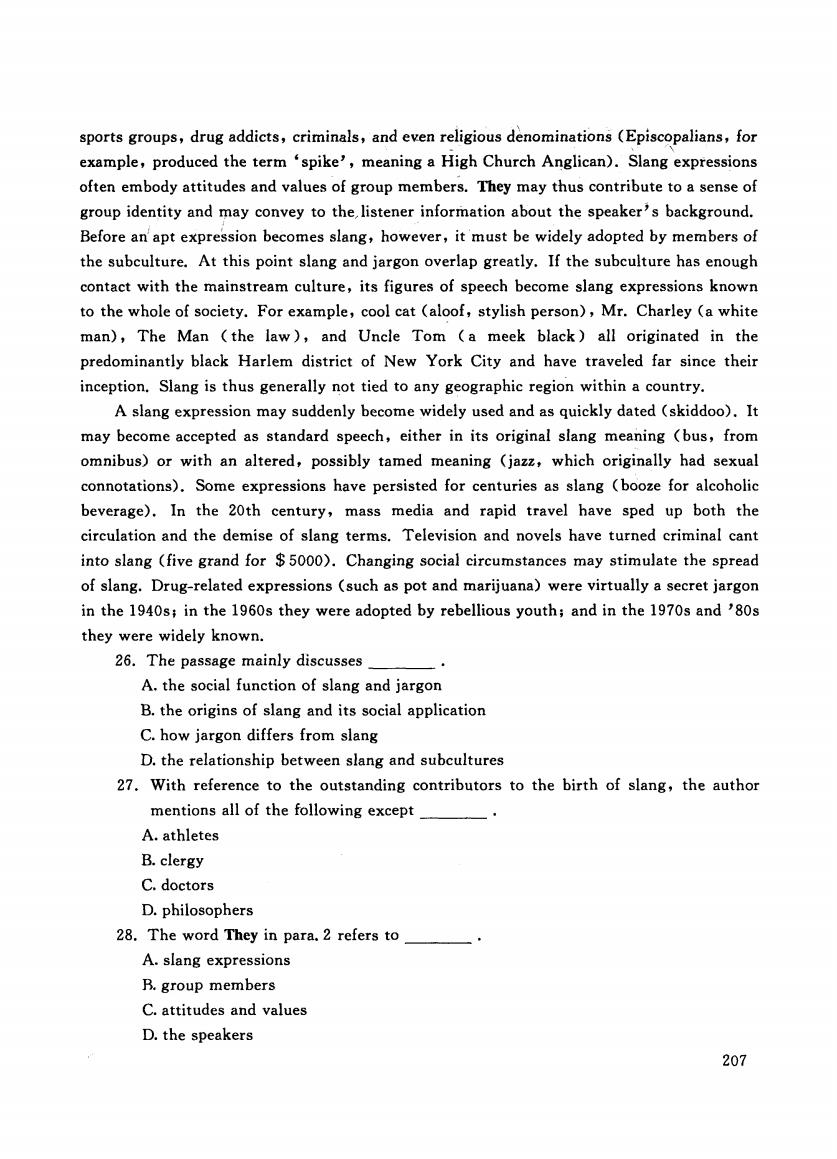正在加载图片...

sports groups,drug addicts,criminals,and even religious denominations (Episcopalians,for example,produced the term 'spike',meaning a High Church Anglican).Slang expressions often embody attitudes and values of group members.They may thus contribute to a sense of group identity and may convey to the listener information about the speaker's background. Before an apt expression becomes slang,however,it must be widely adopted by members of the subculture.At this point slang and jargon overlap greatly.If the subculture has enough contact with the mainstream culture,its figures of speech become slang expressions known to the whole of society.For example,cool cat (aloof,stylish person),Mr.Charley (a white man),The Man (the law),and Uncle Tom (a meek black)all originated in the predominantly black Harlem district of New York City and have traveled far since their inception.Slang is thus generally not tied to any geographic region within a country. A slang expression may suddenly become widely used and as quickly dated (skiddoo).It may become accepted as standard speech,either in its original slang meaning (bus,from omnibus)or with an altered,possibly tamed meaning (jazz,which originally had sexual connotations).Some expressions have persisted for centuries as slang (booze for alcoholic beverage).In the 20th century,mass media and rapid travel have sped up both the circulation and the demise of slang terms.Television and novels have turned criminal cant into slang (five grand for 5000).Changing social circumstances may stimulate the spread of slang.Drug-related expressions (such as pot and marijuana)were virtually a secret jargon in the 1940s;in the 1960s they were adopted by rebellious youth;and in the 1970s and '80s they were widely known. 26.The passage mainly discusses A.the social function of slang and jargon B.the origins of slang and its social application C.how jargon differs from slang D.the relationship between slang and subcultures 27.With reference to the outstanding contributors to the birth of slang,the author mentions all of the following except A.athletes B.clergy C.doctors D.philosophers 28.The word They in para.2 refers to A.slang expressions B.group members C.attitudes and values D.the speakers 207sports groups, drug addicts, criminals, and eyen religious d~nominations (EpIscopalians, for J\ example , produced the term ‘ spike' , meaning a High Church Anglican). Slang expressions often embody attitudes and values of group members. They may thus contribute to a sense of group identity and !)lay convey to the)istener information about the speaker' s background. Before an! apt expression becomes slang, however, it must be widely adopted by members of the subculture. At this point slang and jargon overlap greatly. If the subculture has enough contact with the mainstream culture. its figures of speech become slang expressions known to the whole of society. For example. cool cat (aloof, stylish person). Mr. Charley (a white man). The Man <the law). and Uncle Tom (a meek black) all originated in the predominantly black Harlem district of New York City and have traveled far since their inception. Slang is thus generally not tied to any geographic region within a country. A slang expression may suddenly become widely used and as quickly dated (skiddoo). It may become accepted as standard speech. either in its original slang meaning <bus. from omnibus) or with an altered , possibly tamed meaning (jazz , which originally had sexual connotations). Some expressions have persisted for centuries as slang (booze for alcoholic beverage). In the 20th century , mass media and rapid travel have sped up both the circulation and the demise of slang terms. Television and novels have turned criminal cant into slang (five grand for $ 5000). Changing social circumstances may stimulate the spread of slang. Drug-related expressions <such as pot and marijuana) were virtually a secret jargon in the 1940s; in the 1960s they were adopted by rebellious youth; and in the 1970s and '80s they were widely known. 26. The passage mainly discusses A. the social function of slang and jargon B. the origins of slang and its social application C. how jargon differs from slang D. the relationship between slang and subcultures 27. With reference to the outstanding contributors to the birth of slang. the author mentions all of the following except A. athletes B. clergy C. doctors D. philosophers 28. The word They in para. 2 refers to A. slang expressions R. group members C. attitudes and values D. the speakers 207